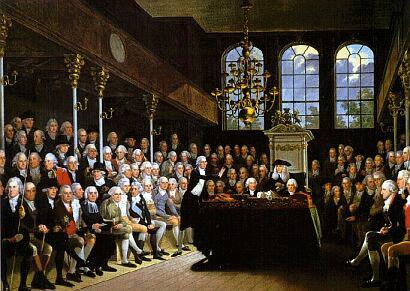
The abolition of the slave trade
In 1788, a number of petitions in favour of the abolition of the slave trade were received by Parliament.
However, the powerful federation of planters, merchants, manufacturers and ship owners - all central to the slave trade - put up a dogged rearguard action against abolition in both the Commons and Lords.
Both sides presented petitions to both Houses of Parliament.
Those petitioning against the trade were encouraged by Thomas Clarkson. One of the purposes of Clarkson's tours of Britain between 1788 and 1794 was to organise and encourage a new public petitioning campaign.
Both sides were using a means of communicating with Parliament that had a long history, but was now on a scale not seen before.
The petitions show that a time when the right to vote was very restricted, the petitioning movement gave many excluded from the electoral process an opportunity to communicate with Parliament.
(Source: http://www.parliament.uk/about/living-heritage/transformingsociety/tradeindustry/slavetrade/overview/ petitioning-parliament/)
Reflective Questions
-
How come the transantlantic slave trade had been going on at least for a hundred years when campaign against it began?
-
Why did it take more than twenty years to abolish the slave trade?
-
What was the alleged economic effect of the slave trade?
-
What kind role did religion play in the campaign against the slave trade?
-
Did the aboliton of the slave trade achive the desired effect?

Parliament's relationship with the transatlantic slave trade
The first parliamentary debates
Wilberforce had met the Society for Effecting the Abolition of the Slave Trade and, with the encouragement of William Pitt, the Prime Minister, agreed to raise their cause in Parliament.In February 1788 the prime minister commissioned a report on the slave trade and the effects and consequences for British commerce. The report was undertaken by the Privy Council committee for trade and foreign plantations.This was followed by a statement in the Commons by William Pitt on 5 May 1788. He said that he would raise the issue by moving a motion "That this House will, early in the next session of Parliament, proceed to take into consideration the circumstances of the Slave Trade".
Wilberforce makes the case
The movement to abolish the slave trade drew on a remarkably wide range of activities, including collecting signatures on petitions, female activism, and distribution of print and graphic images.
It was, however, at its heart, a parliamentary campaign, headed by William Wilberforce. A measure of his success was the fact that by 1792 abolition was an issue entrenched in Parliament. However, it faced a protracted and difficult struggle.
Wilberforce was not formally involved until he was asked by his close friend, the newly-elected Prime Minister, William Pitt, to become the parliamentary spokesman for the campaign in 1787.
The London Committee, part of the Society for Effecting the Abolition of the Slave Trade, made occasional contact with Wilberforce from October 1787, mainly to ask him to raise the issue in debates.
He formally joined the Committee in 1791 and became their spokesman in the House of Commons.
Pitt set up an enquiry into the slave trade in 1788, and laid its report before the Commons in April 1789.
(Source: http://www.parliament.uk/about/living-heritage/transformingsociet/tradeindustry/slavetrade/ overview/)

William Pitt the Younger
History records some of the names of the men who tirelessly campaigned for the abolition of the slave trade. Many will instantly the recall the names of a few men closely associated with this cause - William Wilberforce and Thomas Clarkson are two that spring to mind. The man not instantly connected with abolitionism is, ironically, the man who on May 9, 1788 first gave notice of a motion in the House of Commons for the Abolition of the Slave Trade: William Pitt. He was doing so in support of his friend William Wilberforce, who was seriously ill at the time. It was a cause beset by fierce opposition, and it suffered numerous unfortunate setbacks. Huge efforts were made, and hundreds of petitions were signed by people all over Britain. When Pitt rose to give his speech on the abolition of the slave trade in the early morning hours of April 3, 1792, it was arguably one of the most eloquent speeches of his parliamentary career. Even his political opponents were impressed. Wilberforce wrote that "Windham, who has no love for Pitt, tells me that [Charles James] Fox and Grey, with whom he walked home after the debate, agreed with him in thinking Pitt's speech one of the most extraordinary displays of eloquence they had ever heard."
How unintentionally prophetic were Pitt's words at the close of that speech, when he said:
"If we listen to the voice of reason and duty, and pursue this night the line of conduct which they prescribe, some of us may live to see a reverse of that picture, from which we now turn our eyes with shame and regret. We may live to behold the natives of Africa engaged in the calm occupations of industry, in the pursuits of a just and legitimate commerce. We may behold the beams of science and philosophy breaking in upon their land, which, at some happy period in still later times, may blaze with full lustre."
Sadly, Pitt did not live to see the slave trade abolished by the British Parliament. He died in January 1806, and the Act for the Abolition of the Slave Trade was passed by parliament on March 25, 1807. If some doubted Pitt's sincerity to the cause in later years when the pressures of an unrelenting war with France, and Pitt's increasingly failing health intervened, they certainly did not question him on that night.
(Source: http://www.theprivatelifeofpitt.com/2014/04/pitts-speech-on-abolition-of-slave.html)